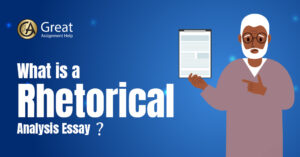Have your professor asked you to submit a rhetorical analysis essay? Are you struggling to write a rhetorical analysis essay? If yes, then this blog post is for you. Especially, for your better understanding, here, we have explained what a rhetorical analysis essay means and how to write them. In addition to that, we have also shared the key components of a rhetorical analysis essay and the effective ways to analyze a piece of text. Continue reading and update your knowledge of rhetorical analysis essay writing.
What is a Rhetorical Analysis Essay?
A rhetorical analysis essay is a kind of essay that views a text based on rhetoric. Moreover, it focuses less on what the author is saying, instead, it looks into how the author is speaking. In a nutshell, a rhetorical analysis essay focuses on the objectives, techniques, and appeals of an author to his audience. Moreover, rhetoric is an art of efficient writing and speaking that analyzes how an author persuades his audience. Perhaps, rhetoric explores a text or an argument to identify its impact on the audience.
Key Components of a Rhetorical Analysis Essay
Subsequently, we have listed some core elements of the rhetorical analysis essay below for your clear understanding.
Appeals
Do you how to convince your audience? If yes, perhaps you have created an appeal and convinced the audience.
Philosopher Aristotle established three common pillars of rhetoric, Let’s explore each of them below:
- Logos- Also known as a logical appeal, it makes use of considerable arguments to convince the audience. Perhaps, it is the most popular perspective in academic writing, where you may develop arguments, applying reasons and justifications.
- Ethos- Alternatively, called an ethical appeal, where the author stresses his authority over a subject. For instance, if you have to make a moral argument, you may highlight your ethically admirable behavior. Also, if you have to make a technical argument, perhaps, you will showcase your expertise through your qualifications.
- Pathos- As the name suggests, a pathetic appeal invokes the audience’s feelings by communicating passionately. Moreover, it makes use of vivid images and induces anger, sympathy, or other feelings in the audience.
Text and Context of the Rhetorical Analysis Essay
- Basically, in rhetoric, a text is not always a writing piece, but rather a communication piece that can be analyzed. Some examples are a speech, satirical image, and advertisement.
- In a rhetorical analysis essay, you should concentrate on multiple languages. But to complete your analysis, you could concentrate on both the visual and sonic components of a text.
- Moreover, a context is anything that surrounds a text, such as an author and the intended audience. You can also investigate the time and location of text production, as well as the key objectives of your text.
For instance, Martin Luther King Jr.’s “I Have a Dream” speech possesses global power. Yet, the civil rights context plays a crucial role, if you want to understand the context.
What are Claims, Supports, and Warrants?
Let’s understand how claims, supports, and warrants create an argument.
- Firstly, as an author, you must make a claim and convince the reader. Either a single claim or several claims can make up an argument. In most cases, you should make a clear claim, but you can apply it to any text.
- Secondly, you can use evidence to back up your claims. As a result, support can come in the form of emotional appeals or even tangible evidence.
- Lastly, a warrant acts as an assumption that connects the evidence to a claim. If the argument is informal, a warrant is typically used; otherwise, it is assumed that the audience may comprehend the connection.
For example, look at this rhetorical statement, and let’s understand the difference.
“Neither girl was well-liked; fans’ turnout in the model hunt was very low.” Certainly, the warrant states that if the girls were well-liked, perhaps the fan turnout was higher.
How Should You Analyze a Text?
Unlike, other essay types, a rhetorical analysis essay might not require you to select concepts in advance. Possibly, you may begin viewing the text in detail and ask relevant questions in terms of how it works. Thus, consider asking the questions given below and analyze the various rhetorical devices the text applies.
- What is the objective of the author?
- Does the author closely focus on the key claims or do they discuss different topics?
- What is the author’s tone, angry or sympathetic, personal or authoritative, informal or formal?
- Who is the intended audience and is it possible to convince them?
- What types of evidence has the author presented?
Rhetorical Analysis Essay Writing Steps
Like any other essay, a rhetorical analysis essay also starts with an introduction presenting the thesis statement. Also, there is a body that analyzes the text and a conclusion that summarizes the whole essay. Let’s explore how.
Rhetorical Analysis Essay Outline
1. Introduction
Like, all essays, be sure to write an introduction for your rhetorical analysis essay as well. Perhaps, you want to state your discussion purpose, significant background information, and thesis definition to the audience.
Example: Martin Luther King Jr.’s “I Have a Dream”, is one of the most popular oratories in American history. Moreover, the speech was delivered in 1963 among numerous civil rights activists beyond the Lincoln Memorial in Washington. The rhetorical analysis debates that the king’s supposition of the prophetic voice, boosted by the historic size of the audience, develops a robust sense of ethos that has maintained its inspirational power over the years.
2. Body
Certainly, it’s the place where you do your analysis as you ought to tackle your texts directly here. Mostly, a body comprises three paragraphs, perhaps it will be used more for a longer essay. Moreover, each paragraph ought to focus on the various elements of the text and thereby contribute to your thesis statement.
Example-
The king’s speech is imbued with prophetic language all over the essay. Also, before the dream part, the king’s speech is made up of a prophetic tone only…
“The whirlwinds of revolt will continue to shake the foundations of our nation until the bright day of justice emerges.” The warning stated here has an apocalyptic tone, yet the conclusion uses a positive image stating the bright day of justice………….
3. Conclusion
Consequently, in the conclusion, you ought to restate your thesis statement, and thereby wrap up your essay. Also, you may attempt to connect both your text and analysis to a wider concern.
Example-
It is evident from this analysis that the efficiency of King’s rhetoric appears less from the pathetic appeal of his “utopian dream”. Moreover, the king makes sure of not only the efficiency of his words at that moment but also their resonance in the present time…
Conclusion
Hopefully, by now, you will have understood how to write a rhetorical analysis essay. In case, you experience difficulties with doing a rhetorical analysis and composing an essay on it, call us immediately.



